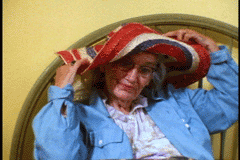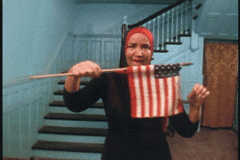Grey Gardens (Albert Maysles, David Maysles, Ellen Hovde,
Muffie Meyer) 1975
 Grey
Gardens is a documentary film that takes us into the (nearly condemned) home
of Big & Little Edie Bouvier Beale, two members of the American
pseudo-royalty, the Bouviers. The majority of the film was shot in a six week
period, and shows the two women in the aftermath of a housing raid by the local
government. Little Edie is forced to stay at Grey Gardens (their Hamptons
estate), ostensibly in order to take care of her mother who is 79 and has
difficulty getting around. Watching the film, however, you get the sense that
Big Edie's simply controlling her daughter because she can. In one scene, Big
Edie barks at least a dozen orders ("I'm cold!", "I'm
hungry!", "Where's my cat?") to Little Edie from the adjoining
room in under a minute.
Grey
Gardens is a documentary film that takes us into the (nearly condemned) home
of Big & Little Edie Bouvier Beale, two members of the American
pseudo-royalty, the Bouviers. The majority of the film was shot in a six week
period, and shows the two women in the aftermath of a housing raid by the local
government. Little Edie is forced to stay at Grey Gardens (their Hamptons
estate), ostensibly in order to take care of her mother who is 79 and has
difficulty getting around. Watching the film, however, you get the sense that
Big Edie's simply controlling her daughter because she can. In one scene, Big
Edie barks at least a dozen orders ("I'm cold!", "I'm
hungry!", "Where's my cat?") to Little Edie from the adjoining
room in under a minute.
Apparently, this film is a cult film
popular among the gay community. That's not surprising, as it seems very similar
in tone to such films as Mommie Dearest and Whatever Happened to Baby Jane?
Familial repression seems that much scarier when you know it's real (or at least
a craftily edited form of reality.) I'm sure Little Edie's fashion sense and
exceptionally quotable one-liners ("This is the worst thing to happen ever
in the history of America!" or "I'm pulverized by this latest
thing.") would also qualify the film for such cult status.
 The film feels pretty exploitative, even though the Beales insist that it's not
exploiting them at all. Still, one gets the impression that the Beales aren't
sound enough of mind to determine whether or not they're being exploited. I'm
not sure if this is because the filmmakers choose to highlight their
eccentricities, or because they are as mentally disturbed as they appear, but
they certainly don't appear to have any real perception of how most of the world
functions. Furthermore, there's the most obvious question of whether anyone
would care to make a film about this people if it were not for their
relationships. Despite, or perhaps because of, the unease that the film causes,
it remains absolutely transfixing. Once the film hooks you, you simply cannot
stop watching. There's an undeniable skill on display here, though the use of
that skill is a bit more contentious.
The film feels pretty exploitative, even though the Beales insist that it's not
exploiting them at all. Still, one gets the impression that the Beales aren't
sound enough of mind to determine whether or not they're being exploited. I'm
not sure if this is because the filmmakers choose to highlight their
eccentricities, or because they are as mentally disturbed as they appear, but
they certainly don't appear to have any real perception of how most of the world
functions. Furthermore, there's the most obvious question of whether anyone
would care to make a film about this people if it were not for their
relationships. Despite, or perhaps because of, the unease that the film causes,
it remains absolutely transfixing. Once the film hooks you, you simply cannot
stop watching. There's an undeniable skill on display here, though the use of
that skill is a bit more contentious.
* * *
October, 2001
Jeremy Heilman